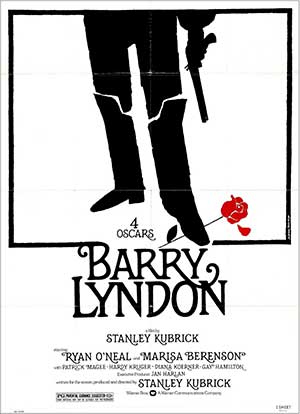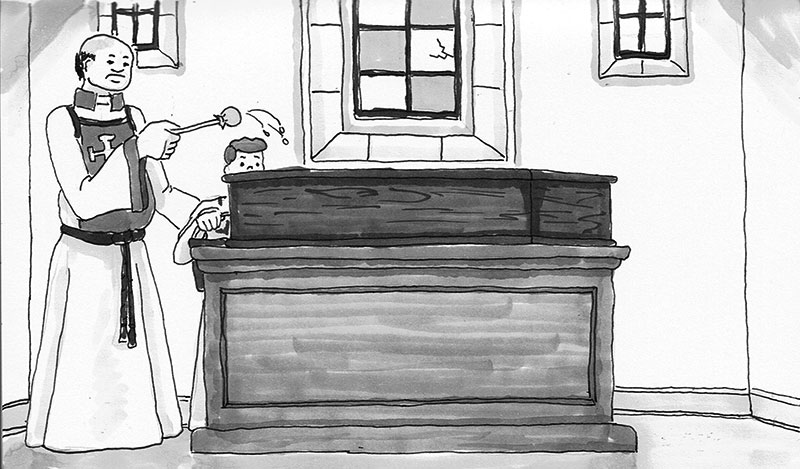My kneecap is hurting me. Ow. That’s better.
The priest took a stick with a knob at the end of it out of the boy’s bucket and shook it over the coffin. Then he walked to the other end and shook it again. Then he came back and put it back in the bucket. As you were before you rested. It’s all written down: he has to do it.
—Et ne nos inducas in tentationem.
The server piped the answers in the treble. I often thought it would be better to have boy servants. Up to fifteen or so. After that, of course …
Holy water that was, I expect. Shaking sleep out of it. He must be fed up with that job, shaking that thing over all the corpses they trot up. What harm if he could see what he was shaking it over. Every mortal day a fresh batch: middleaged men, old women, children, women dead in childbirth, men with beards, baldheaded businessmen, consumptive girls with little sparrows’ breasts. All the year round he prayed the same thing over them all and shook water on top of them: sleep. On Dignam now.
—In paradisum.
Said he was going to paradise or is in paradise. Says that over everybody. Tiresome kind of a job. But he has to say something.
The priest closed his book and went off, followed by the server. Corny Kelleher opened the sidedoors and the gravediggers came in, hoisted the coffin again, carried it out and shoved it on their cart. Corny Kelleher gave one wreath to the boy and one to the brother-in-law. All followed them out of the sidedoors into the mild grey air. Mr Bloom came last folding his paper again into his pocket. He gazed gravely at the ground till the coffincart wheeled off to the left. The metal wheels ground the gravel with a sharp grating cry and the pack of blunt boots followed the trundled barrow along a lane of sepulchres.
The ree the ra the ree the ra the roo. Lord, I mustn’t lilt here.
—The O’Connell circle, Mr Dedalus said about him.
Mr Power’s soft eyes went up to the apex of the lofty cone.
—He’s at rest, he said, in the middle of his people, old Dan O’. But his heart is buried in Rome. How many broken hearts are buried here, Simon!
—Her grave is over there, Jack, Mr Dedalus said. I’ll soon be stretched beside her. Let Him take me whenever He likes.
Breaking down, he began to weep to himself quietly, stumbling a little in his walk. Mr Power took his arm.
—She’s better where she is, he said kindly.
—I suppose so, Mr Dedalus said with a weak gasp. I suppose she is in heaven if there is a heaven.
Corny Kelleher stepped aside from his rank and allowed the mourners to plod by.
—Sad occasions, Mr Kernan began politely.
Mr Bloom closed his eyes and sadly twice bowed his head.
—The others are putting on their hats, Mr Kernan said. I suppose we can do so too. We are the last. This cemetery is a treacherous place.
They covered their heads.
annotation:
The latin phrase Et ne nos inducas in tentationem translates to “and lead us not into temptation” a phrase from a passage in the Bible (Matthew 6:9–13) commonly referred to as “the Lord’s prayer”. That particular phrase might be a harken back to the previous chapter in which Bloom is facing temptation directly.
 This passage once again is focused on death, but this time I find Joyce focusing not just on the morbidity of death but also its egalitarian aspects. The line “Every mortal day a fresh batch: middleaged men, old women, children, women dead in childbirth, men with beards, baldheaded businessmen, consumptive girls with little sparrows’ breasts. All the year round he prayed the same thing over them all and shook water on top of them: sleep. On Dignam now.” points directly to the fact that death comes for everyone. It reminded me strongly of the epilogue of the Stanley Kubrick film Barry Lindon, “It was in the reign of George III that the aforesaid personages lived and quarrelled; good or bad, handsome or ugly, rich or poor, they are all equal now.“
This passage once again is focused on death, but this time I find Joyce focusing not just on the morbidity of death but also its egalitarian aspects. The line “Every mortal day a fresh batch: middleaged men, old women, children, women dead in childbirth, men with beards, baldheaded businessmen, consumptive girls with little sparrows’ breasts. All the year round he prayed the same thing over them all and shook water on top of them: sleep. On Dignam now.” points directly to the fact that death comes for everyone. It reminded me strongly of the epilogue of the Stanley Kubrick film Barry Lindon, “It was in the reign of George III that the aforesaid personages lived and quarrelled; good or bad, handsome or ugly, rich or poor, they are all equal now.“

